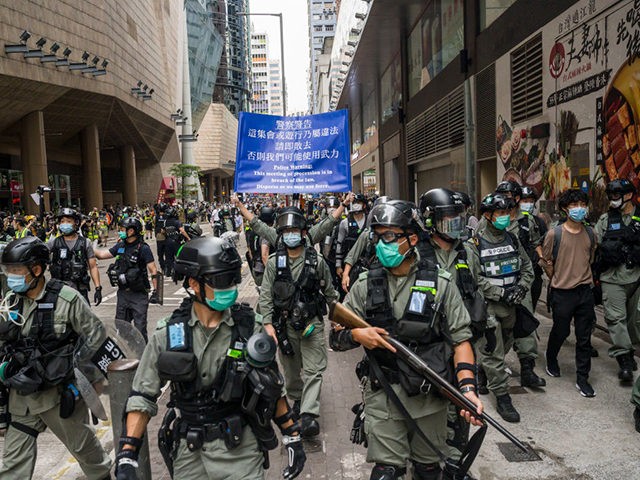The Chinese Communist Party’s (CCP) Global Times on Thursday accused critics around the world of overreacting to the national security law Beijing has imposed on Hong Kong, arguing that measures to curtail the speech and political activity of dangerous “separatists” are appropriate and fall in line with actions taken by other world governments.
The Global Times accused the West of having “bias and double standards” for complaining that the security law will fatally compromise Hong Kong’s autonomy, forever change the island for the worse, and crush political dissent beneath an authoritarian jackboot.
The CCP paper responded by asserting without evidence that “human rights shall be respected and protected” in Hong Kong and its people will still enjoy an array of “rights and freedoms,” including freedom of speech — provided, of course, that any given Hong Konger is not involved in “secession, subversion, terrorist activities, or collusion with a foreign country,” the four offenses covered by the new law.
The Global Times apologia carefully avoided mentioning that Chinese subjects of the Communist Party were long ago stripped of the rights Hong Kong residents supposedly still enjoy, and of course it did not mention that all four of those national security indictments can easily be leveled at anyone the CCP wishes to silence.
In China, the most common charge leveled at political prisoners is “picking quarrels and starting trouble,” which is just another way of saying “subversion.” Anyone in China can be grabbed out of their home and tossed in a cell for months without a trial if the CCP decides they are a picker of quarrels or starter of trouble.
The ugliest part of the Global Times defense of the Hong Kong crackdown was its uncomfortably accurate observation that the Western world has come a long way toward accepting the CCP’s stunted view of free speech:
In many Western countries, including the US, France and Japan, lawmakers have been carefully seeking a balance between freedom of speech and national security or public order-relevant matters, some prohibiting extremist claims or speech with terrorism tendencies. Under the national security law for Hong Kong, as long as the ordinary residents’ claims do not carry on the intention of subversion, terrorism, secession and collusion with foreign forces, some general criticism of the government or officials won’t be affected, legal experts said.
Freedom of speech has never been absolute. For instance, the Catalonia separatists in Spain have been harshly punished for instigating riots and chaos, which has also earned support from the international community.
In a similar vein, the Global Times argued that trial without jury for national security offenses is not that unusual in other countries, and neither are crackdowns on violence and vandalism by demonstrators, or special police and surveillance powers for cases that involve threats to national security.
“There have been similar legal arrangements and means in other countries when it comes to national security-related matters. For example, in the US, the 9/11 attacks in 2001 brought the U.S. government’s fear of terrorism to a boiling point, leading to the Patriot Act. The law expanded the powers of U.S. law enforcement agencies in monitoring citizens’ information and in detaining and expelling expatriates suspected of having links to terrorism,” the CCP paper argued, considerably downplaying the fact that China’s idea of a surveillance state is vastly more intrusive and pervasive than anything envisioned by even the most paranoid Western domestic security agencies.

COMMENTS
Please let us know if you're having issues with commenting.